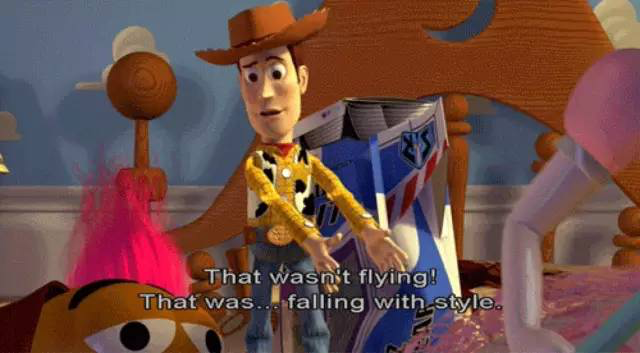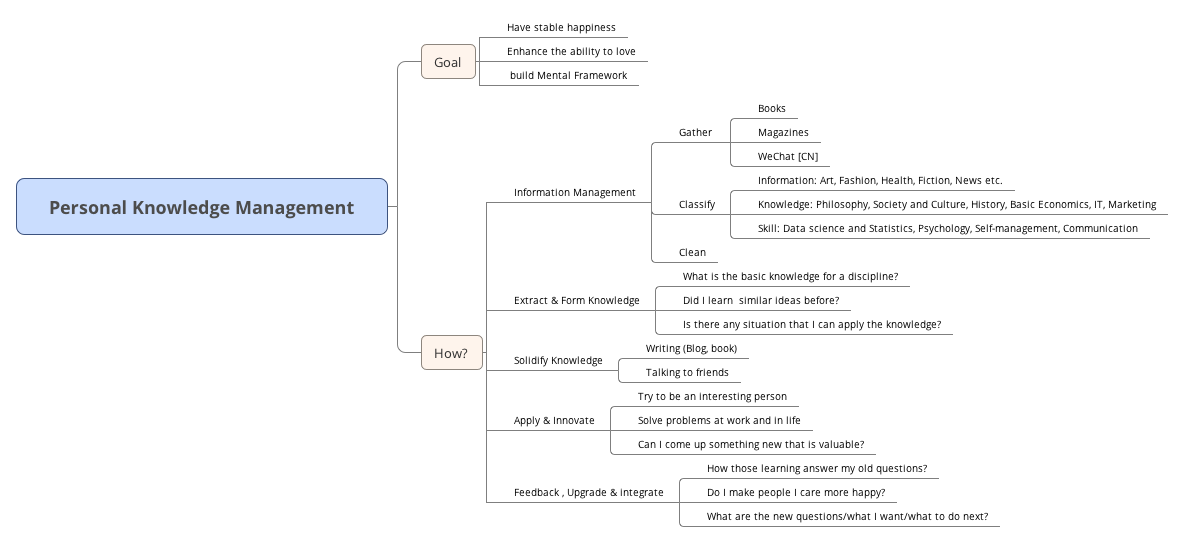Personal Knowledge Management — What, Why and How?(1)
Organised common (or uncommon) sense – very basic knowledge is an enormously powerful tool… You have to have a temperament to grab ideas and do sensible things. [Charlie Munger]
I have always imagined that Paradise will be a kind of library. [Jorge Luis Borges]
Knowledge has to be improved, challenged, and increased constantly, or it vanishes [Peter F. Drucker]
What is PKM?
Here is what I got from Wikipedia:
Personal knowledge management (PKM) is a collection of processes that a person uses to gather, classify, store, search, retrieve, and share knowledge in his or her daily activities and the way in which these processes support work activities. [Wikipedia]
But I have my version of definition:
Personal knowledge management (PKM) is a collection of processes that a person manages information, extracts and refines knowledge, share with others, uses knowledge to do sensible things and breaks boundaries between disciplines. [Hui]
Why PKM?
It takes me very long to realize I badly need PKM. I love books (learning) which has been the case since day one. However, I was not on purposely selective about what I read. As a random reader, I went to a bookstore, randomly picked book and read whatever seemed to interest me at that time. Or sometimes my friends recommended book to me. It actually has been my attitude towards many other things: choose from whatever come to me that seemed interest me instead of knowing what I really want and go to get it. Unfortunately, I happen to be the kind of person who is interested in a million things under the sun. I randomly tried new things that I thought were interesting as if I would never die. It is not hard to imagine how I get myself in trouble…

What made me think I need to change? It goes back to Apr 2012 when a friend and I founded a statistical consulting company that provides statistical training and consulting in Beijing. One year later, both of us quitted and handed it to someone else for different reasons. Actually I was extremely passionated about running the business at that time but I was very unhappy and anxious. I became a terrible stranger to people who are important to me, someone not loving and caring. Later I read about focusing illusion which may explain my situation at that time.
Focusing Illusion: Nothing In Life Is As Important As You Think It Is, While You Are Thinking About It. [Daniel Kahneman]
I could hear God saying: “Hui, stop and think about what you really want.” So I did.
Our happiness is thus not affected to a large extent by reflecting on our lives, but by the flood of feelings that are constantly generated within us. [“The Optimism Bias” by Tali Sharot]
Anyway, I learnt a lot from the experience. Here I just want to mention three learnings that are related to PKM:
-
There are big gaps among:
Information —> Knowledge —> Skill
- I have to be selective: figure out what I want then go to get it
- I need to put effort on building Mental Framework
What is mental framework? It is what Charlie Munger calls Latticework of Mental Models:
You have to learn all the big ideas in the key disciplines in a way that they’re in a mental latticework in your head and you automatically use them for the rest of your life. If you do that, I solemnly promise you that one day you’ll be walking down the street and you’ll look to your right and left and you’ll think “my heavenly days, I’m now one of the few competent people in my whole age cohort.” If you don’t do it, many of the brightest of you will live in the middle ranks or in the shallows. [Charlie Munger]
Reading itself is not enough: you have to be able to grab key ideas and make sense of them. In order to found a sound framework:
- You have to learn different disciplines (as many as you can)
- Put effort on extracting the most important and basic concepts in every discipline and start to learn pattern
Once you have a framework, you can do something we call 触类旁通 in Chinese. Personal Knowledge Management, in my opinion, is a way to build Mental Framework. It aims at:
- Learn a set of strong, useful concepts from each discipline and tie them together in such a way that the whole is greater than the sum of the parts.
- Know the edge of our competency, know that there is much larger part of the world we don’t know.
- Be able to tell what we can do, what we can’t; what is important, what is not. And do the important things that we can do.
How PKM?
PKM needs time to develop and I told myself to be patient. Here is my PKM MindMap (yours can be different):

Personal Information Management
Let’s start from Personal Information Management(PIM). I have been working on it since 2015 (You can see my PIM here). I break the process down to three steps. I will go through it one by one.
Gather Information
There are many information sources (book, magazines, newspaper, radio, internet…). Here are my personal opinions.
-
Use book as the main source and be selective about book. I prefer books prodiving core knowledge and read books with hot knowledge when needed. Let me further explain my definition of the two types of knowledge:
- “hot knowledge” is corresponding to specific concept and hard to generalize to other disciplines or bigger scope. Or it is ephemeral. Books of these kind includes novels, essays, news articles etc. I hope you get the point.
- “core knowledge” is the kind of knowledge that can help us to learn new knowledge, i.e. it will help us to to be a better learner, for example, basic knowledge related to humanity or the mechanism of our brain. Those knowledge can be easily used across disciplines and guide us in different ways. For example, mathematics, psychology, social study, brain research, classic philosophy, logic thinking, some management books that give you basic concepts. One trick: In order to learn core knowledge in an unfamilar discipline, I usually check the most commonly used textbook for the discipline in university. One example is “Marketing Management” by Kotler and Keller. I got several books when I started to work in marketing and “Marketing Management” is one of them. I checked the textbooks for different MBA programs.
- Magzines. It somehow becomes my habit. It is partly from childhood experience and more likely due to the flight miles that are about to expire……: P
- Official WeChat account subscriptions. Information from mobile internet is fragmented but it helps me to keep updated on the trend of some areas in China and keep myself on the same page with my friends in China : ).
- Avoid random browsing online which can be a time black hole. Make sure you know what you want and direct search for it.
- Quit RSS. The reason is the same. They can be a black hole. Don’t worry you will miss some valuable information. If anything is valuable, you will see it somehow elsewhere.
… There are other souces of information (such as talking to friends, professional groups etc) and I am not going to list all.
Classify Information
Next is to classify the information you have. I roughly classify them into 21 categories (see Reading Notes)
> unique(dat$Category)
[1] Art Beauty&Health Biography
[4] Biology Business & Economics Data Science
[7] Gender History IT
[10] Law Medicine Novel
[13] Novels and Plays Novels and Plays-detective Other
[16] Philosophy and Psychology Politics Proses, Essays and Poems
[19] Self-development Society and Culture Statistics
Then it is important to further decide your target knowledge and skill. What are the difference? Here are my definitions:
- Information: something nice to know. You are not sure how to use them and don’t plan to spend time thinking deeper about them either.
- Knowledge: something you want to understand and have your own opinion on. You have to work on the information you gathered, think deeper about it, extract most important and basic concepts. You may also add thought on it.
- Skill: the knowledge you want to use. You have to put it to practice and eventually be familiar with it. In the end, it becomes your experience (long-term memory).
Clean Information
If you keep on collecting, you will eventually feel overwhelmed. That is why you have to clean it. Cleaning follows Occam’s Razor principle:
Occam’s Razor: Suppose there exist two explanations for an occurrence, the simpler one is usually better.
I generally consider it as law of parsimony and try to apply it in different dimensions of my life. Reducing unnecessary complexity has always been my principle.
If you bat away many things, you don’t clutter yourself. [Charlie Munger]
Take “Predictable Irrational” by Dan Ariely as an example. After cleaning the information, what I recorded in my Reading Notes are like this:
- First write down the main topic of the book. Author discussed one kind of irrational behavior in each chapter. So I recorded (1) the irrational behavior (2) the thinking fallacy behind it. For example, chapter 2 is about fallacy of supply and demand.
- What the book is about: The book talks about our irrational behavior and the thinking fallacy behind it.
- Chapter 2
- Irrational behavior: James Assael, Salvador Assael (peark king, James’ son), black pearl from black-lipped oysters, put them in the window of Harry Winston’s store on Fifth Avenue, Tahitian black pearls glowed
- Thinking fallacy (Anchor effect): last two digits of social security number, how much would you pay for the product?
- Anchor effect witll exist for long time even we set new anchor later, we will still be affected by the origional anchor. (anchors in the experiment: 10 v.s. 90, 50, 90 v.s.10 )
- Assael anchored his pearls to the finest gems in the world and the prices followed forever
- Take away points:
- The relationships we see in the marketplace between demand and supply are not based on preferences but on memory
- The sensitive we show to price changes might in fact be largely a results of our memory for the prices we have paid in the past and our desire for coherence with our past decisions—not at all a reflection of our true preference or our level of demand.
- … I will go through the book chapter by chapter. In the end I will have some summary points for the whole book.
The notes shown here may not make sense to you but what is important is that it makes sense to me. I hope you get the idea and you should have a way to clean information that makes sense to you.
Extract & Form Knowledge
Now we get to the difficult part of PKM. So far what we have is just information. There is significant gap between information and knowledge. As I mentioned above, you have to think deeper about the information to make it knowledge. Answering the following 3 questions will guide you through the process:
- What is the basic concepts for a discipline?
- Did I learn similar idea before?
- Is there any situation that I can apply the knowledge?
I will continue the discussion in the next post. Be happy everyone : )!